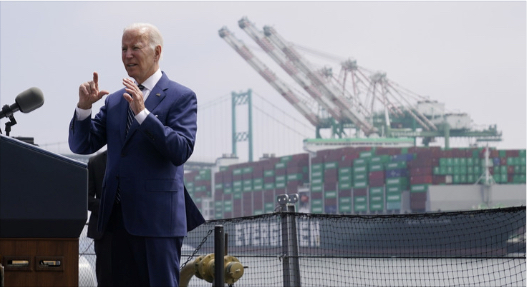
STRATEGIC ASSESSMENT. New York. Officials at the US foreign aid agency reacted with alarm to news of a controversial security pact between China and the Solomon Islands, describing the agreement as “very troubling” and “unfortunate”, newly released internal emails show.
The emails, obtained by Al Jazeera via a freedom of information request, reveal how officials at the United States Agency for International Development (USAID) scrambled to respond to reports earlier this year that Beijing was seeking to bolster security ties with the tiny Pacific Island nation.
In an email reacting to a New York Times article about the proposed pact sent on March 28, Ryan Washburn, USAID mission director to the Philippines, Pacific Islands and Mongolia, expressed alarm about the agreement. “Yikes! This is very troubling,” he said in an email to colleagues.
The United States has decided to limit the use of anti-personnel landmines, joining most countries around the world including all of its NATO allies, in prohibiting the use of the weapons, the White House said on Tuesday.
The move will align U.S policy with the Ottawa Convention, the international treaty prohibiting the use, stockpiling, production, and transfer of anti-personnel landmines, the White House said in a statement.
“The administration’s actions today are in a sharp contrast to Russia’s actions in Ukraine, where there’s compelling evidence that Russian forces are using explosive munitions, including landmines, in an irresponsible manner,” senior State Department official Stanley Brown said.
Shifting political winds during the U.S. November mid-term elections could spell trouble for automakers’ hopes of getting billions of dollars in consumer tax credits that would help the United States compete with Chinese and European rivals.
General Motors Co, Ford Motor Co, Chrysler-parent Stellantis NV and Toyota Motor Corp have pledged to invest more than $170 billion through 2030 to bolster EV development, production and sales.
Automakers are making a furious last-ditch effort to convince Congress to approve an extension of EV incentives before Republicans, who are largely opposed to doling out EV subsidies, could potentially take over both houses of Congress next year.
U.S. President Joe Biden is considering scrapping tariffs on a range of Chinese goods to curb inflation, but no decision is likely before next week’s G7 summit, people familiar with the matter said.
White House officials discussed options on Friday with Biden for reducing some of former president Donald Trump’s punitive duties on China, including potentially substantial cuts, three of the sources said.
Biden’s advisers are poring over Trump-era tariffs on hundreds of billions of dollars of Chinese goods — many of which they see lacking strategic value, the sources said.
A White House spokesperson said the goal was to align the tariffs with U.S. economic and strategic priorities, safeguarding the interests of workers and critical industries, while not “unnecessarily raising costs on Americans.”
President Biden on Wednesday called on Congress to suspend the federal gas tax for three months and asked states to suspend their own gas taxes or provide commensurate relief to consumers.
The federal government charges an 18.4-cent tax per gallon of gasoline and a 24.4-cent tax per gallon of diesel. Suspending the tax for three months — through the end of September, will cost about $10 billion, the White House said.
“I fully understand that the gas tax holiday alone is not going to fix the problem,” Biden said in remarks delivered from the South Court Auditorium. “But it will provide families some immediate relief, just a little bit of breathing room, as we continue working to bring down prices for the long haul.”
Senators voted to speed up the passage of the bipartisan bill, meaning it could be signed into law next week. Although significant, the proposals fall far short of what many Democrats and activists have called for in the wake of a spate of mass shootings.
The measures include tougher background checks for buyers younger than 21.The bill calls for funding to encourage states to implement “red flag” laws to remove firearms from people considered a threat. The act also includes $15bn (£12.2bn) in federal funding for mental health programs and school security upgrades.
And it closes the so-called “boyfriend loophole” by blocking gun sales to those convicted of abusing unmarried intimate partners. Tuesday evening’s Senate vote – which was only procedural – passed 64 to 34 in less than two hours after the final text was circulated.
A snapshot of global opinion has found that approval of Russia has fallen since its invasion of Ukraine, while views of the U.S. and NATO remain largely positive. The number of people who see the U.S. as a reliable partner to their country has increased, in some cases dramatically, over the last year, according to a Pew Research Center survey released Wednesday.
A median of 61% of people in 17 countries polled (not including the U.S.) said they had a favorable view of the country. Sweden, South Korea and Australia are among the countries where the impression of the United States improved significantly in the last year.
In Sweden, for example, 84% of adults polled said that the U.S was a reliable partner, up 21 points from 2021. In South Korea, 83% of people see the U.S. as a reliable partner — up 25 points over the previous year — and in Canada, 84% of people believe so — an increase of 16 points.
Attitudes toward NATO are also largely positive. Views of the military alliance have improved in several countries since last year, including Germany and the U.S., as well as nonmember Sweden, according to the survey. The number of Swedes who have overall favorable opinions of NATO rose from 77% in February to 84% in April (Red/many sources).





